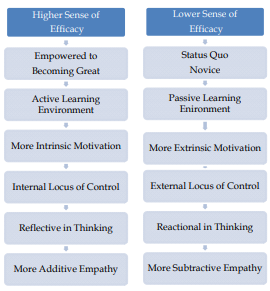version
 | |
Great teachers believe strongly in their instructional sense of efficacy (through self-examination); therefore, they are more likely to create worthwhile experiences for their students, while teachers with a lower sense of efficacy are more likely to view teaching as a mechanical process. For instance, these teachers generally rely too heavily on external props, such as PowerPoint slides (provided by the publisher of the text) to teach.36 This pattern indirectly reinforces the atypical belief that students are passive recipients who “absorb information.” They also tend to believe and act on the notion that they can only teach if they had the right type of student, reflecting an external locus of control. It is important to note, that, novice (who may or may not be new) teachers without teaching experience, may start their career with a lower sense of efficacy because they have not had an opportunity to learn how to engage in reflective thinking. To this end, the point of this section is to differentiate certain aspects between higher and lower sense of efficacy teachers so you are better prepared to foster a higher sense of efficacy quicker. This way you know what to look for when you engage in your new career. |